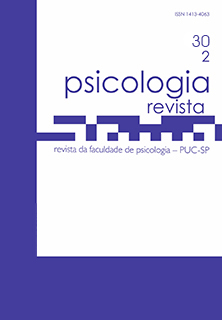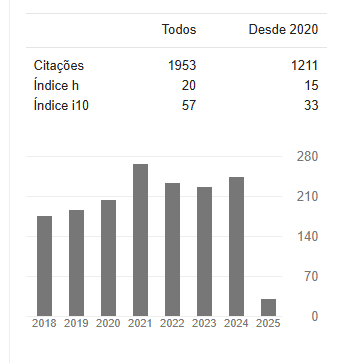From aesthetic utopia to utopian aesthetics
the pulsating language
DOI:
https://doi.org/10.23925/2594-3871.2021v30i2p391-411Keywords:
psychoanalysis, utopia, aesthetics, language, TarkovskyAbstract
This article seeks to underscore the ‘utopia significant, based on an articulation with aesthetics. The premise is not to apply Psychoanalysis to cinema: cinema is applied to Psychoanalysis building a path through which we can listen to the signifiers in their equivocality. With the emergence of an aesthetic utopia, which we illustrate with socialist realism, we understand that a strict language policy was established, restricting games with language and, therefore, discursive possibilities. However, in the entanglements of culture, between closings and (re)openings, a utopian aesthetics can take shape, and also shape the discussion based on Tarkovsky’s cinema, with his outsider cinematographic language. In this sense, what is at stake is the inventive dimension of language, the pulse of the signifiers that call the subjects to position themselves differently.
References
Andrade, H. F. (2010). O realismo socialista e suas (in)definições. Literatura e Sociedade, 15(13), 152–165. https://doi.org/10.11606/issn.2237-1184.v0i13p152-165
Barthes, R. (2013). Aula (L. Perrone-Moysés, Trad.). São Paulo: Cultrix, 2013.
Barthes, R. (2018). A câmara clara: Notas sobre a fotografia (J. C. Guimarães, Trad.; 7. ed.). Rio de Janeiro: Nova Fronteira.
Bloch, E. (2005). O princípio esperança (N. Schneider, & W. Fucks, Trads.). Rio de Janeiro: Contraponto.
Bondarchuk, S. (Diretor). (1975). Eles lutaram pela pátria [Filme]. Mosfilm. YouTube. Recuperado de https://www.youtube.com/watch?v=xfUlR_nuBb4
Boersner-Herrera, A. M. (2010). Representación del intelectual en tiempos de totalitarismo: Ensayo sobre el límite de la obediencia de intelectuales rusos durante la era estalinista (1923-1953). Argos, 27(52), 33–61. Recuperado de https://www.researchgate.net/publication/298925521_Representacion_del_intelectual_en_tiempos_de_totalitarismo_Ensayo_sobre_el_limite_de_la_obediencia_de_intelectuales_rusos_durante_la_era_estalinista_1923-1953
Clark, T. J. (2013). Por uma esquerda sem futuro (J. Viegas, Trad.). São Paulo: 34.
Dadoun, R. (2000). Utopie: L’émouvante rationalité de l’inconscient. In R. Barbanti & C. Fagnart (Eds.), L’art au XXe siècle et l’utopie. Paris: L’Harmattan.
Eisenstein, S. (Diretor). (1925). A greve [Filme]. Goskino. Recuperado de https://www.youtube.com/watch?v=VD40vLjRaNA
Foucault, M. (2000). O que são as luzes? In M. B. Motta (Org.), Arqueologia das ciências e história dos sistemas de pensamento (E. Monteiro, Trad.; Vol. 2; pp. 335–351). Rio de Janeiro: Forense Universitária. (Trabalho original publicado em 1984)
Frederico, C. (2018). Movimentos artísticos e política cultural. Estudos Avançados, 32(92), 105–118. https://doi.org/10.5935/0103-4014.20180008
Freud, S. (1992). Obras completas (J. L. Etcheverry, Trad.; 2. ed.; Vol. 22). Buenos Aires: Amorrortu Editores. (Trabalho original publicado em 1933)
Freud, S. (2018). O futuro de uma ilusão (R. Zwick, Trad.; 2. ed.). Porto Alegre: L&PM. (Trabalho original publicado em 1927)
Jacoby, R. (2007). Imagem imperfeita: Pensamento utópico para uma época antiutópica (C. Araújo, Trad.). Rio de Janeiro: Civilização Brasileira.
Jameson, F. (1997). As sementes do tempo (J. R. Siqueira, Trad.). São Paulo: Ática.
Khrushchov, N. (1998). The secret speech in the 20th congress of the Communist Party of the Soviet Union [1956, Feb. 24–25]. Recuperado de https://www.marxists.org/archive/khrushchev/1956/02/24.htm
Lacan, J. (1998). Escritos (V. Ribeiro, Trad.). Rio de Janeiro: Zahar.
Lacan, J. (2008). A lógica do fantasma: Seminário 1966–1967 [Publicação não comercial exclusiva para os membros do Centro de Estudos Freudianos de Recife]. (Trabalho original publicado em 1967)
Marshall, H. (1992). The new wave in Soviet cinema. In A. Lawton (Org.), The red screen: Politics, society, art in Soviet cinema (pp. 173–190). London: Routledge.
Metz, C. (1972). A significação no cinema (J.-C. Bernardet, Trad.; 2. ed.). São Paulo: Perspectiva.
Miranda, A. B., & Sousa, E. L. A. (2018). Psicanálise: Uma vocação utópica. Psicologia USP, 29(1), 106–115. https://dx.doi.org/10.1590/0103-656420140019
Orwell, G. (2009). 1984 (A. Hubner & H. Jahn, Trads.). São Paulo: Companhia das Letras.
Oudart, J.-P. (1977). Dossier Suture: Cinema and suture. Screen, 18(4), 35–47. https://doi.org/10.1093/screen/18.4.35
Rancière, J. (2012). O espectador emancipado (I. Benedetti, Trad.). São Paulo: Martin Fontes.
Saraiva, L. (2006). Montagem Soviética. In F. Mascarello (Org.), A história do cinema mundial. São Paulo: Papirus Editora.
Sousa, E. L. A. (2009). Psicanálise e a vocação iconoclasta das utopias. Morus: Utopia e Renascimento, 6, 397–403. http://dx.doi.org/10.1590/0103-656420140019
Sousa, E. L. A. (2011). Por uma cultura da utopia. E-topia: Revista Electrónica de Estudos sobre a Utopia, 12, 1–7. Recuperado de https://ler.letras.up.pt/uploads/ficheiros/8907.pdf
Tarkovsky, A. A. (Diretor). (1962). A infância de Ivan [Filme]. Mosfilm. YouTube. Recuperado de https://www.youtube.com/watch?v=aRkPoF7iVGc
Tarkovsky, A. A. (2010). Esculpir o tempo (J. L. Camargo, Trad.; 3. ed.) São Paulo: Martins Fontes.
Tarkovsky, A. A. (2012). Diários: 1970–1986 (A. Lázarev, Trad.). São Paulo: É Realizações.
Thompson, K., & Bordwell, D. (2002). Film story: An introduction (2nd ed.). New York: McGraw-Hill.
Vasilyev, S., & Vasilyev, G. (Diretores). (1934). Chapaev [Filme]. Lenfilm Studio. YouTube. Recuperado de https://www.youtube.com/watch?v=T6KDKMgALps
Vertov, D. (Diretor). (1929). Um homem com uma câmera [Filme]. YouTube. Recuperado de https://www.youtube.com/watch?v=sGanECSgRNE
Weinmann, A. O. (2014). Infância: Um dos nomes da não razão. Brasília: Editora da Universidade de Brasília.
Weinmann, A. O. (2017). Sobre a análise fílmica psicanalítica. Revista Subjetividades, 17(1), 1–11. https://dx.doi.org/10.5020/23590777.rs.v17i1.5187
Zamiátin, E. I. (2017). Nós (G. Soares, Trad.). São Paulo: Aleph.
Downloads
Published
How to Cite
Issue
Section
License
Copyright (c) 2021 Maria Lucia Macari, Amadeu de Oliveira Weinmann

This work is licensed under a Creative Commons Attribution 4.0 International License.














